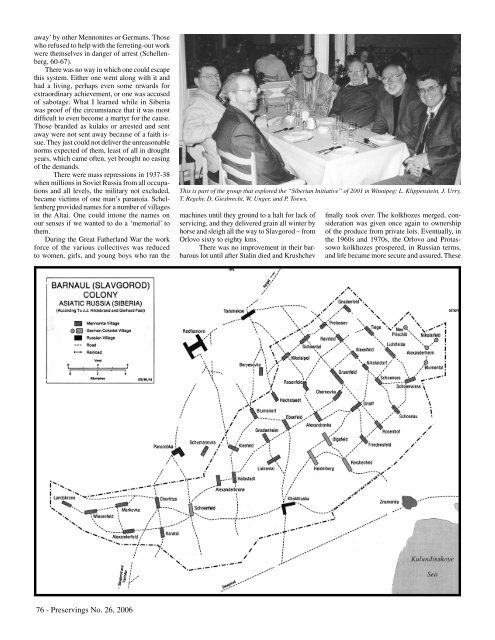Preservings $20 Issue No. 26, 2006 - Home at Plett Foundation
Preservings $20 Issue No. 26, 2006 - Home at Plett Foundation
Preservings $20 Issue No. 26, 2006 - Home at Plett Foundation
You also want an ePaper? Increase the reach of your titles
YUMPU automatically turns print PDFs into web optimized ePapers that Google loves.
away’ by other Mennonites or Germans. Those<br />
who refused to help with the ferreting-out work<br />
were themselves in danger of arrest (Schellenberg,<br />
60-67).<br />
There was no way in which one could escape<br />
this system. Either one went along with it and<br />
had a living, perhaps even some rewards for<br />
extraordinary achievement, or one was accused<br />
of sabotage. Wh<strong>at</strong> I learned while in Siberia<br />
was proof of the circumstance th<strong>at</strong> it was most<br />
difficult to even become a martyr for the cause.<br />
Those branded as kulaks or arrested and sent<br />
away were not sent away because of a faith issue.<br />
They just could not deliver the unreasonable<br />
norms expected of them, least of all in drought<br />
years, which came often, yet brought no easing<br />
of the demands.<br />
There were mass repressions in 1937-38<br />
when millions in Soviet Russia from all occup<strong>at</strong>ions<br />
and all levels, the military not excluded,<br />
became victims of one man’s paranoia. Schellenberg<br />
provided names for a number of villages<br />
in the Altai. One could intone the names on<br />
our senses if we wanted to do a ‘memorial’ to<br />
them.<br />
During the Gre<strong>at</strong> F<strong>at</strong>herland War the work<br />
force of the various collectives was reduced<br />
to women, girls, and young boys who ran the<br />
This is part of the group th<strong>at</strong> explored the “Siberian Initi<strong>at</strong>ive” of 2001 in Winnipeg: L. Klippenstein, J. Urry,<br />
T. Regehr, D. Giesbrecht, W. Unger, and P. Toews.<br />
machines until they ground to a halt for lack of<br />
servicing, and they delivered grain all winter by<br />
horse and sleigh all the way to Slavgorod – from<br />
Orlovo sixty to eighty kms.<br />
There was no improvement in their barbarous<br />
lot until after Stalin died and Krushchev<br />
finally took over. The kolkhozes merged, consider<strong>at</strong>ion<br />
was given once again to ownership<br />
of the produce from priv<strong>at</strong>e lots. Eventually, in<br />
the 1960s and 1970s, the Orlovo and Protassowo<br />
kolkhozes prospered, in Russian terms,<br />
and life became more secure and assured. These<br />
76 - <strong>Preservings</strong> <strong>No</strong>. <strong>26</strong>, <strong>2006</strong>
















